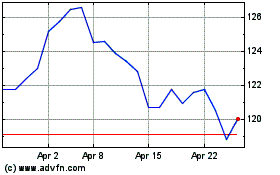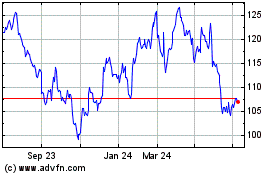By William Boston
BERLIN -- Volkswagen is staying Volkswagen.
Volkswagen AG's U.S. subsidiary said Tuesday the company would
rebrand itself as Voltswagen of America to promote it's electric
car strategy, but a spokesman for the parent company in Germany
later said the move was a joke.
The name change, which immediately lit up social media and
online news sites, was originally intended as an early April Fools'
Day stunt to get people talking about VW's ambitious electric car
strategy as the company rolls out its first all-electric
sport-utility vehicle, the ID. 4, in U.S. dealerships, the
spokesman said.
The problem for VW is that everyone took them seriously,
creating confusion about the company's intentions and moving the
shares, putting VW's communications team on the defensive.
"We didn't mean to mislead anyone," a Volkswagen spokesman in
Wolfsburg told The Wall Street Journal. "The whole thing is just a
marketing action to get people talking about the ID.4."
Changing the name of a company and a rebranding of this order
would have far-reaching consequences. Dealerships that have already
invested huge sums to prepare for the rollout of the ID. 4 and
other coming electric car models would likely have to dip into
their pockets again to redesign their showrooms and redo local
advertising.
A badge change on any new car would likely require changes in
production or assembly, possibly involving new parts that bear a
new logo.
The spoof began late Monday, when VW communications in the U.S.
published a draft of the press release on the company's website and
then quickly took it down, according to VW officials in
Germany.
They left the document online long enough to grab the attention
of journalists and VW fans, sparking a flood of online news and
tweets.
VW communications officials in the U.S. declined to comment at
the time and didn't respond to renewed requests for comment on
Tuesday. VWoA president and CEO Scott Keogh didn't respond to an
emailed request for comment.
Volkswagen's top executives have become more active on social
media recently. The CEO, Herbert Diess, is a frequent contributor
to his LinkedIn page and recently opened a Twitter feed. But until
now the company has refrained from PR stunts or outlandish
statements that are more typical of Tesla CEO Elon Musk, who has
run into trouble with the Securities and Exchange Commission in the
past for allegedly misleading investors on Twitter.
Early Tuesday, a VW official in Germany told the Journal that
the name change shouldn't be taken seriously. But after it became
clear the joke's intended recipients were doing exactly that,
officials in Germany scrambled to reach their colleagues at VWoA
headquarters in Herndon, Va., to pull the plug on the campaign,
according to Wolfsburg officials who asked not to be named.
"There will be no name change," the official said, speaking on
condition of anonymity.
By then, however, VWoA had published the release in full again
on the U.S. website, a move that suggested the name change was in
fact real and would take effect as stated in the release in
May.
The press release quoted Mr. Keogh as president and CEO of
Voltswagen of America saying: "We might be changing out our K for a
T, but what we aren't changing is this brand's commitment to making
best-in-class vehicles for drivers and people everywhere."
Investors have been clamoring for shares of companies involved
in electric vehicles and have recently been pouring money into the
stocks of established car makers with solid EV plans.
The second publication of the press release helped send VW
shares 5% higher on the Frankfurt stock exchange, handily
outperforming the broad DAX index of German blue-chip stocks.
Among old-school auto makers, VW has been a leader in developing
and launching new electric vehicles, aiming to switch to a largely
electric fleet within the decade. But not all the press has been
glowing, and executives at the company often complain that they
don't get enough credit for the company's transformation.
VW shocked consumers around the world six years ago, when U.S.
authorities charged the company with rigging diesel-powered
vehicles to cheat on emissions tests. VW pleaded guilty to charges
of fraud, conspiracy and selling goods in the U.S. under false
pretenses. The "dieselgate" scandal has so far cost VW more than
$35 billion in fines, compensation and legal fees.
With its reputation shattered, VW has since rebuilt itself into
a leader in making electric vehicles, investing tens of billions of
dollars in building a new generation of EVs as the company vies to
overtake Tesla Inc. as the biggest EV maker in the world.
The road to electric cars has been fraught with setbacks. The
new vehicles -- VW's ID. 3 and ID. 4, the e-tron built by its
luxury car maker Audi, and the Taycan made by its sports-car brand
Porsche -- have had to overcome obstacles and met with mixed
reviews. The ID. 3, which wasn't released in the U.S., initially
struggled with software glitches.
The name change stunt comes as the company is eager to get U.S.
consumers jazzed about the ID. 4, which went on sale in U.S.
showrooms this month. The vehicle is a competitor to Tesla's Model
Y and has been praised largely as very good, but still not quite a
match for Tesla's offering.
Earlier this month, VW released earnings for 2020, which showed
that the company had weathered the Covid-19 pandemic well. Despite
the pandemic, VW generated pretax profit of EUR12 billion,
equivalent to $14.07 billion, down about 36% from 2019, on sales of
EUR223 billion, down 12%. The company benefited strongly from
China's recovery, where VW generates more than 40% of its
sales.
--Ben Foldy contributed to this article.
Write to William Boston at william.boston@wsj.com
(END) Dow Jones Newswires
March 30, 2021 16:56 ET (20:56 GMT)
Copyright (c) 2021 Dow Jones & Company, Inc.
Volkswagen (TG:VOW3)
Historical Stock Chart
From Mar 2024 to Apr 2024

Volkswagen (TG:VOW3)
Historical Stock Chart
From Apr 2023 to Apr 2024
